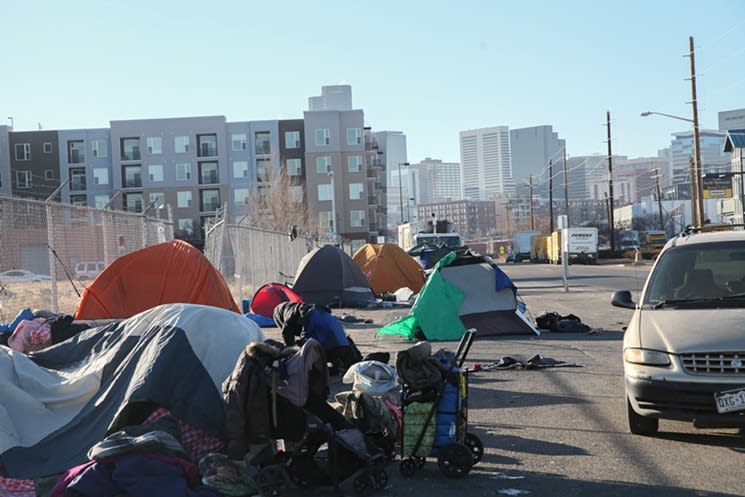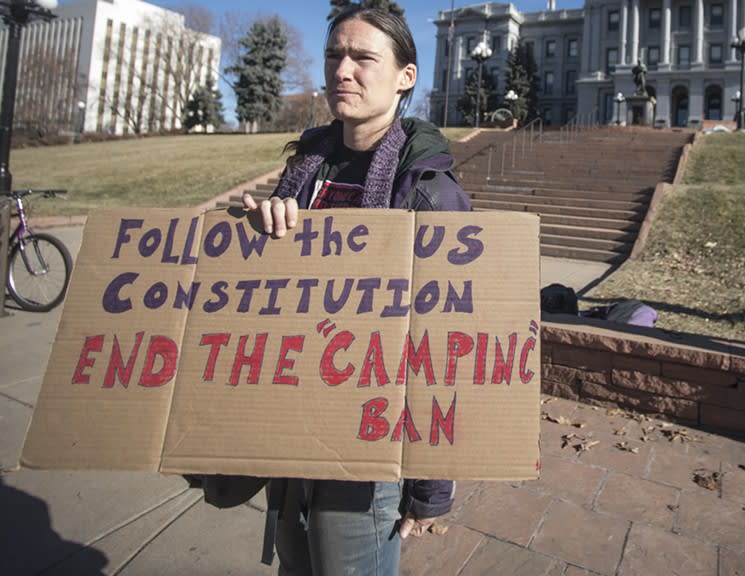
An encampment — which was later forced to dismantle — near the Platte River in 2016.
Brandon Marshall
Brandon Marshall
Boise, a lot like Denver, has recently experienced the trials of forcing camping bans and has learned a better way forward. Both Denver and Boise are capital cities of mountain states in the West, cultural centers that market their recreational attractions and have also drawn a recent boom of industry and investment.
Boise has found a new approach to addressing homelessness, one that moves away from criminalizing it. As a city, it’s a few years of legal and political battles ahead of where Denver might find itself, now that Denver County Court Judge Johnny Barajas has declared this city’s camping ban unconstitutional under the Eighth Amendment.
There are two major differences between the situation in Boise and the one in Denver. The first is scale. Denver is over three times Boise’s size, with a much larger metro area sprawling around it. According to the 2019 Point in Time Survey (by nature an underestimate), over 3,943 people were homeless in Denver on a single night, with over 554 of those people living completely unsheltered — i.e., on the streets. By contrast, Boise had a homeless population of at least 713, with 61 people unsheltered.
Second, the Ninth Circuit’s ruling didn’t say that punishing people for sleeping outside is unconstitutional all the time, but rather when no other option is available for them. This means the constitutionality of the ordinance is contingent upon the space available in Boise’s shelters. By contrast, Denver County Court Judge Johnny Barajas ruled that the camping ban facially violates the Eighth Amendment, a more sweeping decision.
As Denver’s camping ban is tested in courts — the city is appealing the decision — it may join Boise as a battleground of rising tensions over a national question: Is it cruel and unusual punishment to ticket, arrest and cite people for sleeping on the streets?
The Case Against Boise’s Camping Ordinance
Attorney Howard Belodoff has represented the six plaintiffs in Martin v. Boise since its beginning. According to him, the case evolved from a dispute between the city and one of its shelters. For a long time, Boise had two shelters: a Christian shelter called Boise Rescue Mission, which served single men and woman, and a city-owned one managed by a nonprofit called Community House, which served men, women and families. In the mid-2000s, the city controversially took over the latter shelter following a dispute with Community House and eventually sold it to the Rescue Mission, which turned it into an all-male shelter, effectively evicting hundreds of residents. The City of Boise was eventually ordered to pay $1million after Community House, represented by Belodoff, won a lawsuit alleging discrimination and violation of the Fair Housing Act.
Two ordinances that criminalize sleeping outside in Boise had been on the books for decades. But Belodoff hadn’t heard of the laws being enforced until the shelter fiasco kicked hundreds of unhoused people out and left them with nowhere to go. Boise police began issuing tickets and arresting people for camping and sleeping on public property — quite aggressively, according to Belodoff.
“I have all the emails from the top about doing camper sweeps,” Belodoff says. “They made a game out of it — how many tickets they could issue, how many they could arrest.”
In response, Belodoff and another attorney, Maria Foscarinis of the National Law Center on Homelessness and Poverty, sued Boise, claiming its actions were unconstitutional under the Eighth Amendment. The situation also presented an issue of freedom of religion, because the Boise Rescue Mission, then the only shelter in town, has strict curfew and religious requirements. Those seeking shelter have to check in between 4 and 5:30 p.m. each day, limiting their options for work, and in order to stay for long, they must participate in an “intensive, Christ-based residential recovery program” of which “religious study is the very essence.”
Eventually, a new “low-barrier” shelter, the Interfaith Sanctuary, opened, with 160 beds for men, women and children. But it fills up quickly, and on some nights there are no shelter options in town for unhoused people. In 2015, as the court case continued, a large encampment developed behind Interfaith Sanctuary, bringing the issue to the forefront of public discussion.
According to Jodi Peterson, now the executive director of the Interfaith Sanctuary, the situation was “pretty untenable. It was very difficult. … A group of homeless people had created a little tent city, and what everyone decided to do was turn their back on them and not learn about them. There was nothing being offered to these people to learn about their needs.”
The Interfaith Sanctuary welcomes everyone, regardless of gender, religion or drug and alcohol usage. But Peterson says she understands why some still wouldn’t seek shelter. One couple’s daughter had died while they were living in the shelter; the traumatized pair would have had to be separated into men’s and women’s dorms and didn’t want to be split up.
Eventually, police broke up the encampment. But the community learned from its experience, Peterson says, that criminalizing homelessness was not the solution.
In September 2018, the Ninth Circuit ruled that enforcing the anti-camping ordinance was unconstitutional when shelters were full. Though the City of Boise appealed the decision, it also modified the ordinance to comply with the ruling.
Now, Peterson says, the police department checks in with the shelters daily to see if they have space. If there is no accessible space in any shelter (according to Belodoff, this basically depends on whether Interfaith has space), police won’t ticket people.
According to Peterson, police have come to form a closer-knit relationship with the unsheltered population, which is small enough that officers who patrol on bikes downtown know many people’s situations and stories. The city issued only two tickets in 2019.
“I am really quite comfortable with the ruling as it is because it does have flex to it,” Peterson says. “Criminalizing homeless people is not a solution, ever, but you do have to have a tool to make sure that unsafe conditions don’t develop.” And, she adds, it’s helped push the community toward finding different solutions, politically and socially.
Then, at the end of last year, longtime mayor Dave Bieter, who had consistently argued in favor of enforcing the camping ordinance, stood the test of re-election. “His whole campaign was the camping ordinance,” Peterson says, “and he kind of threw our homeless population under the bus.” The strategy didn’t work, and Bieter’s opponent, Lauren McLean, who opposes the camping ordinance, won with 65 percent in a December runoff.
“Hopefully it gets people thinking about the other solutions, what can we do. It’s not a problem that can’t be overcome if people will honestly deal with it,” Belodoff says. “Wasting money on litigation doesn’t seem to be a viable option.”

Terese Howard, a longtime local advocate of people experiencing homelessness. Evan Semón
Denver Homeless Activists Look Ahead
Denver, meanwhile, potentially has years of litigation over the camping ban ahead of it. Martin v. Boise provided a first-of-its-kind framework for cases challenging these kinds of laws, but Denver is a test on another scale: a stricter ruling, applied to a bigger city with a political atmosphere that has recently proven less sympathetic to those on the streets.
In some ways, those who want Denver’s camping ban off the books may now face a more significant battle. Encampments like the one that caused an uproar in Boise (and eventually resulted in a less harsh perspective toward the homeless) are a constant presence in downtown Denver. Unlike Boise’s, Denver’s shelter system rarely reaches capacity. While Boise often issued tickets and arrests, Denver police rarely make arrests for camping-ban charges — though they do issue “move along” orders under the camping ban and patrol encampments constantly. All of that contributes to a more difficult political battle: In last May’s mayoral election, incumbent Michael Hancock, who implemented and defended the camping ban, prevailed, and voters overwhelmingly shot down a proposal to repeal it.
But according to Judge Barajas, that doesn’t make Denver’s camping ban any less unconstitutional. In fact, the ruling he issued is more sweeping than the Ninth Circuit’s, declaring the camping ban unconstitutional “on its face.” Because Denver has appealed the ruling, the ban hasn’t technically been struck down, though the city is not currently enforcing the camping ban, confirms Denver Police Department spokesperson Jay Casillas.
According to attorney Andy McNulty, who represented Jerry Burton in the case against the camping ban, it all boils down to Denver’s shelter system. Proponents of the camping ban often say that it’s a tool to help people into shelters, but opponents say many people are unable or unwilling to utilize them.
“I think the judge in our case was even more clear on the broad types of reasons why shelters may not be accessible,” says Terese Howard, an activist with Denver Homeless Out Loud. In a four-day hearing for the case, academic experts and people who had been or were homeless testified about their experience with and knowledge of Denver shelters. Some said people traumatized by homelessness being crammed together triggered PTSD and panic attacks. Others got shut out because of curfews. One man testified that he had heard such bad stories about shelters that he was afraid to visit one.
Effectively, Howard says, there’s no way Denver could ever prove that it has accessible space for every single possible person in need of shelter on a given night. “How are you going to assess that particular person’s situation and whether it’s accessible to them? Are you gonna go through a list of questions — do you have PTSD, mental health issues, do you have to work early in the morning?”
As it stands there, is not enough extra shelter space to accommodate all unsheltered individuals counted in the 2019 Point in Time survey. During the hearing, the city argued that if more people sought shelter than space available, it could open recreation centers and organize transportation there. But in practice, McNulty says, the point where demand exceeds supply has rarely been reached, because so many people don’t feel comfortable going to a shelter in the first place. “The reality of the situation is that people get turned away all the time,” he says. “The testimony came out at the hearing that there is insufficient shelter space. It just is not workable for a lot of folks.”
McNulty had brought several Fourteenth Amendment complaints to the table, arguing that the law targeted homeless people, as it almost exclusively has been used against them (rather than, say, people camping out to taste a new flavor of whiskey), thus violating the Equal Protection Clause. He also argued that the camping ban violated their right to travel, right to bodily integrity and right to privacy, and that the ban’s underlying purpose was to push homeless people out of public spaces and “warehouse homeless individuals in remote, stigmatizing shelters.”
He says he may bring those arguments back into the picture upon appeal.
Almost everything about the camping ban is up in the air right now, but the ruling could also make political waves. Though voters overwhelmingly shot down Initiative 300 in May, which would have repealed the camping ban, among other measures, repealing it outright isn’t off the table. Councilwoman Candi CdeBaca says she’s looking into pushing for repeal, which would need nine votes from Denver City Council to pass, as Hancock has said he will veto it.
“When we’re looking to figure out what we want to do, looking at cities like Boise is a good idea,” McNulty says. “But we need to do better than any of these other cities in the Ninth Circuit that are confronted with the fact that they can’t just criminalize people and push them out of their cities. We need to work together to find solutions to actually solve homelessness.”




































































































